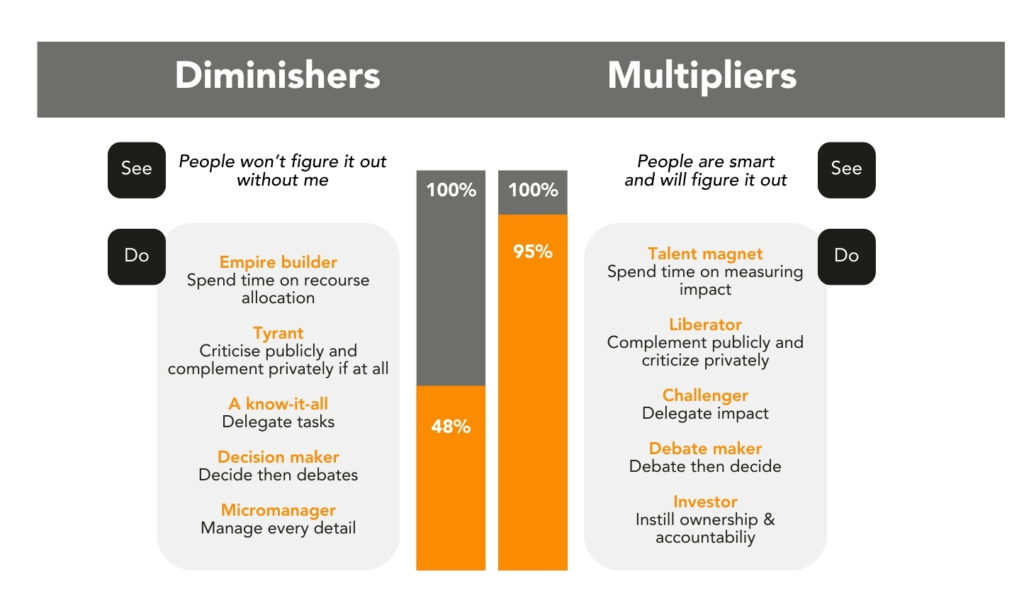Attitudes impact your effectiveness
Attitudes of leaders can as you know vary. However, in this article I will prove that your attitude impacts your effectiveness. Your attitude influence how well you manage your resources.
Being a genius or genius maker
There is a big difference between leaders who believe they are the smartest person in the room and leaders who make everyone else smarter.
Diminishing leaders drain intelligence, energy, and capability from the people around them.
Multiplying leaders use their intelligence to amplify the smarts and capabilities of the people around them.
Some leaders make others feel they are geniuses, and other leaders are genius makers. If you want to be a leader others love to follow, you must move away from a model where the manager knows, directs, and tells toward one where the leader sees, challenges, asks, and unleashes the capabilities of others. Leaders need to go from being the genius, the most intelligent person in the room, to a genius maker. A leader that multiplies the genius in others. In a fast-moving world, you do not need leaders who waste talent and suppress innovation, which hinders growth and profitability.
Are you a genius or a genius maker?
The best leaders make everyone smarter
In the best-selling book “Multipliers – How the Best Leader Makes Everyone Smarter” Liz Wiseman describes how the best leaders bring out the best in their people. Liz’s studies show that American managers, on average, only use 66% of their organization’s resources. This means they are paying 1 dollar but only 60 cents back. My colleagues and I can confirm this is true in any organization globally. Logically, it is ridiculous to pay 1 dollar and get 60 cents back, wouldn´t you agree? However, this is not just a logical matter; it is very emotional for many people. Being overworked and underutilized at the same time is not much fun!
Different assumptions
Multipliers and diminishers make very different assumptions about the intelligence of the people they work with. Both attract top talent, but what differentiates them is what they do with it once it’s in the door. Diminishing leaders drain intelligence, energy, and capability from the people around them. Multiplying leaders use their intelligence to amplify the smarts and capabilities of the people around them.

Some leaders ask questions they know the answers to. They do this to ensure that people can do their work and to position themselves as the smartest person in the room. Other leaders ask questions they do not know the answers to. They do this to ensure that they use the full brainpower of their organization.
Diminishers give answers. Good leaders ask questions.
Multipliers ask the really hard questions.
Reflection:
Are the leaders in your organization geniuses or genius makers?
Multiplying leadership
What is multiplying leadership and how can you become a genius maker? Let´s explore:
Multipliers are talent magnets
Multipliers are magnets attracting high-quality talent because people want to work for a leader who gives them space to learn and grow. Diminishers build empires of talent that they control, intending to be productive, but waste these resources by micromanaging. The first key to being a talent magnet is to look for talent everywhere. Understand there are many different types of genius and talents. This includes finding people’s natural strengths. Everyone has unique skills; learn how to identify, test, and apply them. There is no reason to find the smartest working people only to restrain them with mundane and straightforward work.
Learn more on how to find the genius in your people. (länka till organize + genius teams)
Multipliers are liberators
Multipliers create a highly motivating work environment where people are required and allowed to think for themselves. Liz describes this positive work environment as comfortable and intense, where fear is lifted, and creative thinking is encouraged. On the other hand, Diminishers act as Tyrants, inducing a fear of judgment on their subjects that inhibits people’s ability to think and function. This pressure creates a hostile environment, stopping subordinates from taking risks or contributing ideas. People will hold back around Diminishers because they fear the repercussions of suggesting ideas that disagree with the Tyrant’s thinking.
Multipliers are challengers
Multipliers challenge their workforce by giving them opportunities to rise to the occasion. They set huge impact goals with short timelines, so-called stretch OKRs. As Liz explains, Multipliers generate a belief that the impossible is actually possible. This lies in stark contrast to Diminishers, who separate themselves as experts, taking control of ideas and giving direction to showcase their knowledge.
Multipliers are debate-makers
Multipliers use collective knowledge to debate ideas and develop the best solutions. Ideas are not based on the rank of those who made them but on creativity and the best outcomes. By incorporating teams into the idea-generating processes, they see the issue from various perspectives, understand the problem and solution, and see the big picture. This understanding creates a plan and action for people to be more invested in. This is key as involvement directly impacts engagement. I will keep reminding you of this throughout the book as this may be one of the essential skills to master to be successful in unpredictable and disruptive environments since running workshops is a huge time saver despite what it looks like.
On the contrary, Diminishers make decisions alone or with their small inner circle. They leave the remainder of the organization in the dark as to why a decision was made, and instead of an explanation, they give direct instructions on how to accomplish something. They delegate tasks. Delegating tasks is a trap for doing wasteful work. People want to connect that what they are doing matters to the greater purpose and vision.
Multipliers are investors
Multipliers create extraordinary results by expecting great results across the line. They invest in their employees’ learning and development journeys (LQ and DQ, remember). They hold their teams publicly accountable for their impact, creating ownership of the results. They complement teams publicly and criticize privately. Giving group feedback fosters a sense of shared responsibility that helps the entire team feel responsible. If something fails, they ask, “What did you learn?”
In contrast, Diminishers act as micromanagers, driving results by keeping ownership and directing every detail. If something fails, they look for someone to blame rather than understanding what can be learned. Accidental diminishers swoop in and solve problems for their team members. This takes away the leader’s time and the team’s ability to solve and learn from the problem. It will also become a pattern. Stopping subordinates from learning sets them up to make the same mistake again because the leaders might not always watch over their shoulders.
People don´t get better around diminishing leaders however they grow and develop around multiplying leaders. Diminishing leaders may get some results, but they never utilize the full potential of their teams and organization. I’m sure you have met leaders who are diminishing more than once during your career, and in some parts, you might even have acted partly this way despite having the best intentions. However, if you want your leadership and your organization to remain relevant in years to come, you must learn to get more output from your existing resources. To make this happen, you must want to be a genius maker.
Just as organizations that do not serve their customers become outdated, in the same way,
I believe that diminishing leaders will have no place in any modern organization.
Key takeaways
Leadership Impact: Leaders can either diminish or multiply the capabilities of their teams. Diminishers stifle growth by draining energy and intelligence, while multipliers inspire and amplify the talents of others.
Self-Reflection for Leaders: Even well-intentioned leaders may exhibit diminishing behaviors. Recognizing and correcting these tendencies is essential for fostering a thriving and engaged team.
Future of Leadership: Modern organizations require leaders who empower and elevate others. Becoming a genius maker is not just beneficial but essential for long-term relevance and impact.
Your Attitudes Impact Your Effectiveness
The effectiveness of a leader depends significantly on their attitude toward the intelligence of those they lead. Leaders can either act as geniuses, hoarding control and ideas, or as genius makers, enabling others to thrive and contribute at their highest potential. While both types of leaders may attract top talent, their impact diverges sharply once talent is onboard. Diminishersdrain intelligence, energy, and capability from their teams. They stifle growth, inadvertently or otherwise, by focusing on their own abilities rather than empowering others. In contrast, multipliers use their intelligence to amplify the talents and capabilities of those around them, unlocking potential and fostering growth.
Multiplying Leadership
Multipliers lead by example and embody key traits that transform their teams and organizations. They are:
- Talent Magnets: They attract and retain the best talent by creating environments where people can thrive.
- Liberators: They foster a culture of trust and safety, allowing individuals to express ideas freely and take risks.
- Challengers: Multipliers push their teams to achieve more by setting high expectations and inspiring them to surpass their limits.
- Debate-Makers: They encourage robust, thoughtful discussions, ensuring that decisions are well-informed and collaborative.
- Investors: They dedicate time and resources to developing others, empowering them to grow and take ownership of their work.
The Cost of Diminishing Leadership
Diminishing leaders limit their teams’ potential. While they may achieve short-term results, they fail to fully leverage their team’s capabilities, often leading to disengagement and stagnation. In contrast, multiplying leaders inspire growth and innovation, ensuring long-term organizational relevance and success.
Are you ready to become a genius maker and multiply your impact?


